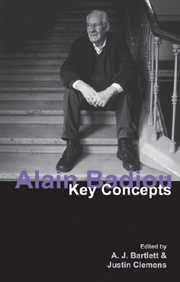Book contents
- Frontmatter
- Contents
- Contributors
- Acknowledgements
- Abbreviations
- Miscellaneous Frontmatter
- Introduction: Badiou's form
- 1 Biography and early works
- PART I THE FOUNDATIONS OF BADIOU'S THOUGHT
- PART II BADIOU'S KEY CONCEPTS OR “CONDITIONS”
- 6 Science
- 7 Love
- 8 Art
- 9 Politics
- PART III BADIOU'S ENGAGEMENT WITH KEY PHILOSOPHERS
- Afterword: Badiou's futures
- Bibliography
- Index
8 - Art
from PART II - BADIOU'S KEY CONCEPTS OR “CONDITIONS”
- Frontmatter
- Contents
- Contributors
- Acknowledgements
- Abbreviations
- Miscellaneous Frontmatter
- Introduction: Badiou's form
- 1 Biography and early works
- PART I THE FOUNDATIONS OF BADIOU'S THOUGHT
- PART II BADIOU'S KEY CONCEPTS OR “CONDITIONS”
- 6 Science
- 7 Love
- 8 Art
- 9 Politics
- PART III BADIOU'S ENGAGEMENT WITH KEY PHILOSOPHERS
- Afterword: Badiou's futures
- Bibliography
- Index
Summary
The relation of philosophy and art, according to Alain Badiou – himself a great stylist and successful playwright – is at once obvious and somewhat twisted. For one thing, they do not communicate directly, but through the relation both entertain with a third term, which they do not reach in the same way: truth. If philosophy does not produce truths of its own, it certainly has something to say about truth: it reaches it through eternity, by formalizing the production of universal patterns of thought. Art, on the contrary, produces truths of its own, but it does so through oblique means, by dealing with sensible images, objects, bodies, or the material dimension of language, the finiteness of which seems to stand in contradiction with the infinite nature of truth.
This intricate disposition of art and philosophy with regard to truth results in the following paradox. On the one hand, art is held to be one of the “conditions” of philosophy, along with mathematics, politics and love: as such, it is only natural to expect it to play a major role in the doctrine (MP 35). As a matter of fact, Badiou's writings make constant use of artistic examples and paradigms, taken from both “high” and “low” cultures. The philosopher's range does not reduce to the familiar icons of modernism, even though his personal preferences more than often draw him in that direction. The image of horses drawn on the walls of a prehistorical cave are discussed along with experiments in painting by Picasso (LW), Malevich (TC) or Duchamp (Badiou 2007d).
- Type
- Chapter
- Information
- Alain BadiouKey Concepts, pp. 82 - 93Publisher: Acumen PublishingPrint publication year: 2010
- 2
- Cited by

